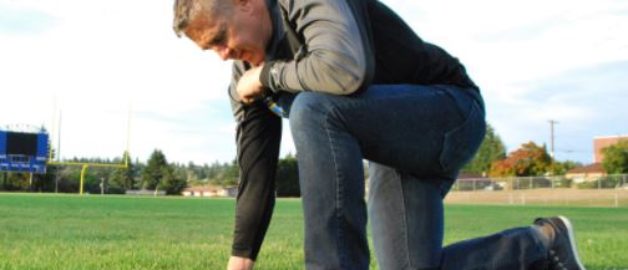First Down for “Religion of Secularism”: Football Coach Update
Joe Kennedy is a beloved coach, community leader, and a devout Christian.
He coached football in Washington state for Bremerton High School from 2008 to 2015, but is most well-known for being “on the defensive lines” in a church/state battle concerning a coach’s ability to pray. He had a tradition of praying on the 50-yard line following every football game. Although it was a personal tradition, soon parents and students voluntarily wanted to join him. Eventually, he was fired. We have addressed some of these issues in our book, Navigating Public Schools (more below).
The controversy had started in September of 2015, when Kennedy received a letter from Superintendent Aaron Leavell of the Bremerton School District (BSD), stating that Kennedy’s practices were “problematic” under the Establishment Clause. He advised that Kennedy was allowed to give inspirational talks, so long as they “remain entirely secular in nature…”. Kennedy appropriately requested a religious accommodation under the Civil Rights Act of 1964 so he could continue praying privately at the 50-yard line following every football game.
In October, following multiple letters between BSD and Kennedy, he received word from BSD that stated he could not exercise his faith in a way that led to the perception of District endorsement of religion. Kennedy made the case that it was a personal decision to pray following the football games and he was not forcing anyone to join him. He elected to continue his act of prayer, despite the school demanding he cease displays of his faith in Jesus. The BSD then notified Kennedy via a letter on October 28th that he had violated the District’s policies, and placed him on paid leave. Joe Kennedy was sadly unable to coach his team the following year.
Kennedy was not yet ready to give up the game, however. On August 9th, 2016, Kennedy filed suit in the Western District of Washington, stating his First Amendment right was violated under Title VII of the Civil Rights Act of 1964. He sought a preliminary injunction against BSD, but was denied by the district court. Kennedy appealed to the 9th Circuit Court of Appeals, who delivered their verdict on January 25th, 2018, ruling that “Kennedy spoke as a public employee, and not as a private citizen, when he prayed on the fifty-yard line in view of students and parents immediately after BHS football games.” The court said that “a resumption of Kennedy’s conduct would violate the Establishment Clause.” Kennedy’s lawyers are stating that they will bring the case to the highest levels of the U.S. Supreme Court.
As we discuss in our book, Navigating Public Schools, teachers and coaches do have a First Amendment right to express their religious beliefs after school hours (note students have this right during school hours, but students have more rights than teachers and coaches in this regard). See Appendix C in our book, which includes some excerpts from material by Alliance Defending Freedom. The legal question in the Kennedy case is whether the time following a football game is considered school hours. Most free speech and religious rights organizations would say this is Kennedy’s personal time and it is too restrictive to say that a person cannot pray in their personal time in public, even if they are a coach. The courts (which tend to be very liberal in the 9th circuit) sided with the BSD and did not view this time as personal time. However, this case highlights the importance of the Supreme Court in our nation’s trajectory. We hope that the judicial system will recognize Kennedy’s freedom to pray personally in his own time as an important aspect of his First Amendment rights. Otherwise, the Supreme Court warns us from past cases:
“The state may not establish a ‘religion of secularism’ in the sense of opposing or showing hostility to religion, thus ‘preferring those who believe in no religion over those who do believe.’ Refusal to permit religious exercises thus is seen, not as the realization of state neutrality, but rather as the establishment of a religion of secularism.” (U.S. Supreme Court, Abington Township v. Schempp (1963).

